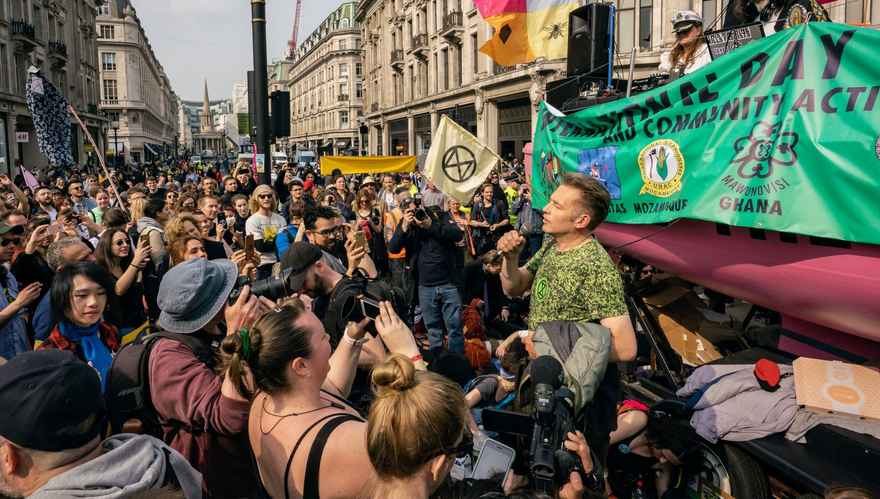A Day in the Time of Climate Emergency

We are experiencing a step change in the United Kingdom in our relationship to climate change. And it is a positive shift. For at least 5 years, it has been accepted that the climate is changing and humans are responsible. Climate denialism has been pushed to the fringes – where it still festers in some quarters.
Yet, in times of rapid change, the pace and scope of change can take me by surprise. A few weeks ago one such moment arrived. It was in the midst of the Extinction Rebellion’s weeks of action where activists blockaded bridges and main streets in London.
These non-violent direct actions generated masses of overwhelmingly positive publicity. Even the Metropolitan Police Commissioner, Cressida Dick struggled to condemn the actions. Although the police still arrested every 1000 activists.
What has shifted is that there is no longer a need to justify radical action to change our way of life, and alongside the shift, I perceive a willingness and openness of many (most?) people for change. Whether that openness to a radical change agenda is translated into radical action remains to be seen.
This change was brought home to me by BBC Radio asking to interview me on prime time national radio about Deep Adaptation. Deep Adaptation is the realisation that we are in a climate emergency. This realisation is based on the latest science. We all can see our world is rapidly changing.
Those of us exploring Deep Adaptation are beginning to come to terms with what those changes are and what it means for us:
- Our political and economic systems are so far unable to mobilise the scale of change
needed to ensure our continued survival. - We are going to have to change, or repurpose just about everything we do and how we do it, from generating energy, to our economic system.
- We are going to shift our sense of who we are, from, ‘We are somehow separate the earth’ to ‘We are the earth’.
- We are at the beginning of a massive step change in our lives.
- We are going to have to come to terms with lots of change and lots of loss.
- Collapse due to climate shifts (and biodiversity loss) is inevitable, catastrophe is likely, and extinction is possible.
Deep Adaptation was framed in a paper by Dr Jem Bendell, available here. It is now reckoned to be the most read academic article ever.
From my viewpoint, to be interviewed on a very popular national radio station about the radical on climate change, without the need for a ‘balance’, is completely outside my range of experience. In fact, the whole morning programme from 06.00-09.00 was all about climate change and what we need to do about it. How did that happen?
At least in the UK, the Overton Window has shifted around ecology and climate. When the Overton Window shifts, change, deep radical change, is suddenly possible. This change will not necessarily be good or positive or will lead to solutions to the actual problems that our society is facing. It will be up to us to seize this opportunity to make the change that will actually move us to a regenerative culture.
To help with this shift, Gaia Education will be offering in the coming months some new courses in what will help create real solutions to the climate and biodiversity predicaments we are facing. We will be building online courses around questions such as, Can capitalism and a habitable planet coexist?, and In light of the climate crisis and the deep adaptation agenda, how does one now define the good life?
I am writing this because our brothers and sisters in other countries may not have heard about the changes that are happening in the UK. Our media doesn’t necessarily report these kinds of things. And also I feel, at least in the UK, this is an important point which needs to be recognised and we all need to reassess our organisations and campaigns accordingly and update ourselves. If not, we will miss the opportunities now open to us in the new world that is appearing before our eyes in real time.
Extinction Rebellion has three demands of the UK government; to “tell the truth” about the scale of the environmental crisis the world faces, for the UK to enact legally binding policies to reduce carbon emissions to net zero by 2025, and to form a Citizens’ Assembly to oversee the changes needed to achieve this. The first demand has been met, the UK parliament voted on May 1st to declare a climate emergency.
We are on the longest of long roads to a regenerative culture. There is no time to waste, and yet it is important to stop and savour the sweetness of our world. We live in a time of paradox, unknowns, and crucially no guarantees. We can’t let this stop us or create hesitancy. The drumbeat of life is calling us to act now to realign our culture and our selves with itself.
Written by Naresh Giangrande
May 2019





0 comments
Leave a comment